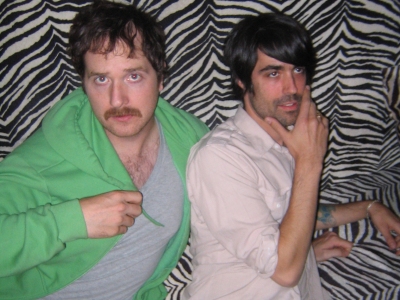 Mike Stroud: Where’s your neck? Hiding hickies under there?
Mike Stroud: Where’s your neck? Hiding hickies under there?Litter Paragon: Uh…I just thought I’d wear my cat scarf to your show. Which was great by the way.
MS: Thanks. I hope I don’t smell too bad. I’m really sweaty.
LP: Haha, everyone is, I think. How do you like it here? Have you or Evan (Mast) ever been to Oberlin before?
MS: This is our first time. It just seems really small. I don’t know. I was just in the bus and then in this building here, and then that ‘Sco place. It seems good. Do you like it?
LP: Yeah, I love it. You and Evan met at college, right?
MS: Yes, at Skidmore, but we hardly knew each other really. And we didn’t really play together until 2001 or something like that. I was a classical music major, and then I realized the whole college thing is kind of bullshit and I left after two years. Like, it’s so motherfuckin’ expensive, you know? And as a musician, you just have to do it. A lot of music business you can’t learn in school.
LP: How did you first cultivate your highly recognizable sound?
MS: What do you mean?
LP: Usually, with both your remixes and your original work, you can immediately recognize it as Ratatat.
MS: We just make music. The new record was mostly recorded in two days. There was no time to plan ahead. Evan had some beats or whatever, and then we just slammed through the rest of it.
LP: How much of the melodic content is charted out, or planned before hand?
MS: None of it. It’s mostly improv.
LP: Where do you find more inspiration, in hip hop or in electronic music?
MS: I kind of hate electronic music. And I hate modern hip hop too, actually. The kind of music that influences me most in making the melodies and everything is classical music. All the remix shit, all that stuff – that’s Evan’s thing, not mine. If I listen to hip hop, it’s stuff like Wu Tang.
LP: Funny you should mention Wu Tang. GZA was here a little over a week ago.
MS: You get a lot of good music here, don’t you?
LP: Yeah; it’s amazing. You’re touring with some great artists yourself – how is tour going?
MS: It’s so good. The guy from Panther and I have become really tight over the past couple weeks. It’s crazy. My favorite band to tour with, ever, probably.
LP: A lot of people expect to see two traditional DJs, bent over laptops when they see you live, which is not at all what you do. How do you decide which parts to play live, which parts to sample…?
MS: We were never going to be just some laptop band. I don’t know. We just play what we think will bring more energy to the show.
LP: You said you don’t like electronic music…but the new Animal Collective remix of your song “Mirando” is being called a 10-minute techno masterpiece. How do you feel about that?
MS: Honestly I couldn’t care less.
LP: Really? It’s a milestone for Animal Collective to be remixing. Do you like Animal Collective?
MS: Uh…I don’t know. I just don’t really care.
LP: Do you even like the remix albums that you guys have put out?
MS: I guess they’re ok. But that is Evan’s thing. I don’t have much of a say in it.
LP: You’re a big part of the Brooklyn music scene. How do you like it there?
MS: I love it. We’ve been focusing on our own shit lately, but it’s a good place to be for music and stuff. Where do you live?
LP: Colorado. But I’ll probably end up in Brooklyn like most other Oberlin graduates.
MS: Oh yeah? Where in Brooklyn?
LP: I’m not sure –
MS: Oh, ok, I get it, I get it. You don’t want to tell me where you live.
LP: No, I just don’t kn-
MS: Well, I’ll give you my exact address – I’ll tell you exactly where I live. I live at ________ in Williamsburg. You can come party with us. Why so mysterious? Just tell me where you live! Where do you live?!
LP: I don’t know yet!
MS: Ok. I’ll give up. Any more questions?
LP: Yeah! Your music has been featured on TV, in movies, in Louis Vuitton fashion shows, and even in hospitals where new mothers are giving birth, according to Pitchfork. How does this kind of ubiquity feel?
MS: I mean, I guess we just don’t really pay that much attention. It’s kind of weird, I guess.
LP: Well, it was a fantastic show. Congratulations on the new album and the international tour. Where are you most excited to go?
MS: We really like Switzerland, Europe in general I guess.
LP: Very cool. Well, it was nice meeting you. Have a good tour.
MS: You too.


